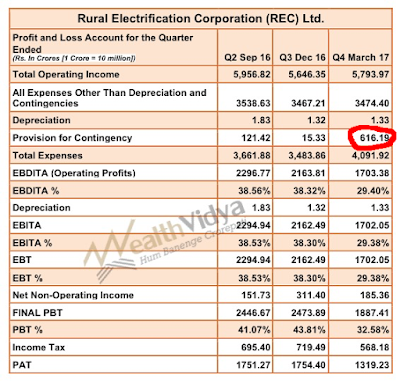Dear Friend!
Rural Electrification
Corporation (REC) Ltd. is a wonderful company.
I too own 564 shares as
on date at an average holding cost of Rs.125.07.
Last week, while I was
on vacation in Goa, I received two sms alerts informing me that the scrip has
corrected by 5.58 and 5.08%, respectively.
Many people might have
been spooked by such alerts, but not value investors. I did not panic at all,
for I kew very well that REC is a wonderful company and nothing could go
fundamentally wrong with it so suddenly.
After returning from the
holiday I investigated the cause for the steep and sudden fall.
I was relieved to fund
out that the cause for the market panic was a fairly large provision for
contingency of Rs.616.19 crores (most likely towards bad debts) and
consequent dip in the quarterly profit after tax to the extent of 24.80%
compared to the previous quarter.
Tighter regulations and
close monitoring of ‘Non
Performing Assets (NPAs)’ from the last couple of years is forcing all
financial institutions to come clean on their NPAs. Banks especially public
sector banks have been making huge provisions for many quarters in the past.
REC and PFC also have been making such provisions, though to a lesser extent.
Please see the following
table for the provisions made in the last three quarters:
You can see for yourself
that though fairly large, this provision is certainly not alarming, nor is the
dip in the profits. REC continues to maintain very strong PBT and PAT margins
of over 32% and 22% respectively.
In conclusion let me
reiterate that the fundamentals of REC are intact, that there is no need to
panic, please do hold the shares you already have and continue to buy as the
scrip is available at discounted prices with a price
to earnings (PE) ratio of 6.02 and a price
to book value ratio of 0.65.
Thank you,
With Best Regards,
Anand











